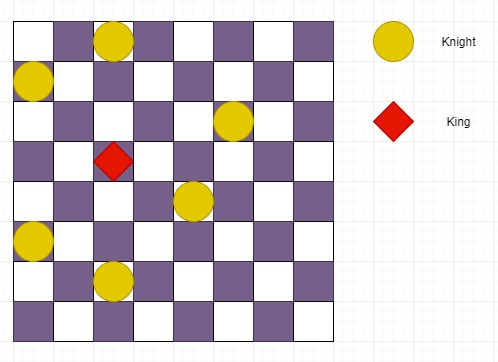
 Data Structure
Data Structure Networking
Networking RDBMS
RDBMS Operating System
Operating System Java
Java MS Excel
MS Excel iOS
iOS HTML
HTML CSS
CSS Android
Android Python
Python C Programming
C Programming C++
C++ C#
C# MongoDB
MongoDB MySQL
MySQL Javascript
Javascript PHP
PHP
- Selected Reading
- UPSC IAS Exams Notes
- Developer's Best Practices
- Questions and Answers
- Effective Resume Writing
- HR Interview Questions
- Computer Glossary
- Who is Who
Check if a king can move a valid move or not when N nights are there in a modified chessboard in Python
Suppose we have one infinite chessboard with the same rules as that of chess and if there are N knights coordinates on the infinite chessboard and the king’s coordinate, we have to check whether the King is checkmate or not. The coordinate of infinite board is bounded by large value like (-10^9 <= x, y <= 10^9).
So, if the input is like knights position = [[2,1],[1,3],[3,6],[5,5],[6,1],[7,3]] and king position: [4,3],

then the output will be True, as king has no move, so it is check mate.
To solve this, we will follow these steps −
- my_dict := a new map
- for i in range 0 to n, do
- x := a[i, 0]
- y := a[i, 1]
- my_dict[x, y] := 1
- my_dict[x - 2, y + 1] := 1
- my_dict[x - 2, y - 1] := 1
- my_dict[x + 1, y + 2] := 1
- my_dict[x + 1, y - 2] := 1
- my_dict[x - 1, y + 2] := 1
- my_dict[x + 2, y + 1] := 1
- my_dict[x + 2, y - 1] := 1
- my_dict[x - 1, y - 2] := 1
- for i in range -1 to 1, do
- for j in range -1 to 1, do
- nx := king_pos[0] + i
- ny := king_pos[1] + j
- if i is not same as 0 and j is not same as 0, then
- if my_dict[(nx, ny)] is zero, then
- return False
- if my_dict[(nx, ny)] is zero, then
- for j in range -1 to 1, do
- return True
Example
Let us see the following implementation to get better understanding −
def is_checkmate(a, n, king_pos):
my_dict = {}
for i in range(0, n):
x = a[i][0]
y = a[i][1]
my_dict[(x, y)] = 1
my_dict[(x - 2, y + 1)] = 1
my_dict[(x - 2, y - 1)] = 1
my_dict[(x + 1, y + 2)] = 1
my_dict[(x + 1, y - 2)] = 1
my_dict[(x - 1, y + 2)] = 1
my_dict[(x + 2, y + 1)] = 1
my_dict[(x + 2, y - 1)] = 1
my_dict[(x - 1, y - 2)] = 1
for i in range(-1, 2):
for j in range(-1, 2):
nx = king_pos[0] + i
ny = king_pos[1] + j
if i != 0 and j != 0:
if not my_dict[(nx, ny)]:
return False
return True
a = [[2,1],[1,3],[3,6],[5,5],[6,1],[7,3]]
n = len(a)
pos = [4, 3]
print (is_checkmate(a, n, pos))
Input
[[2,1],[1,3],[3,6],[5,5],[6,1],[7,3]], 6, [4, 3]
Output
True

Advertisements
